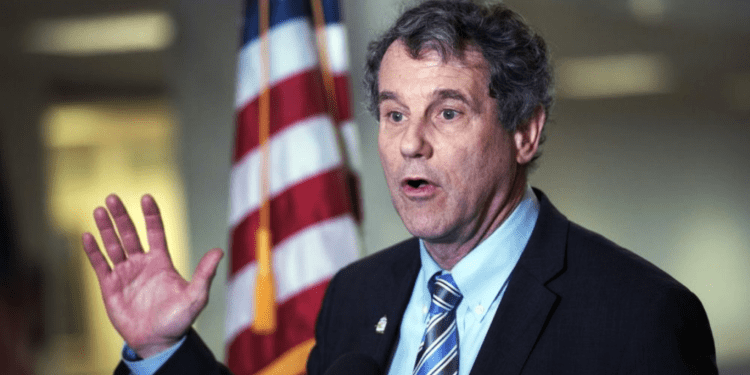- Sen. Sherrod Brown says SEC should consider banning cryptocurrency, citing harm to customers and financial security.
- Crypto CEOs blame unclear regulatory framework for offshore trading.
- Some Senators believe FTX’s collapse does not represent the crypto industry.
Senate Banking Chairman Sherrod Brown urged the SEC on Sunday to address the crypto market and consider banning the digital asset following FTX’s catastrophic collapse.
The leading events and eventual collapse of FTX in November alarmed regulatory agencies globally and have resulted in various speculations and calls for strict regulations to be enforced on the crypto industry or implementing an outright ban.
Brown told NBC’s “Meet the Press” moderator Chuck Todd that the Treasury Department and “all the different agencies” need to get together and assess any possible action related to the cryptocurrency market.
“Maybe banning it, although banning it is very difficult because it will go offshore and who knows how that will work,” he said.
The Senator has expressed his skepticism about crypto several times over the year, voicing his concerns on stablecoin issuance and cryptocurrency advertising and marketing campaigns.
Brown led the hearing on FTX and its founder, Sam Bankman-Fried’s case at the Capitol in Washington on Dec.14, along with a separate hearing by the House Financial Services Committee.
In a tweet, he applauded the justice Department and the Bahamian authorities for holding Sam Bankman-Fried accountable, adding that the Senate Banking and Housing committee would uncover crypto’s risk to consumers, the financial system, and national security.
Call for Clarity
The European Union had earlier taken the initiative with MICA, Markets in Crypto Asset Law- supposed to take effect in 2024- to tame the volatile “Wild West” market.
However, cryptocurrencies and related businesses in the United States have remained largely unregulated. Financial industry executives and lawmakers have called on regulators to protect crypto investors, restating the need for effective measures on the crypto ecosystem.
During the Reuters NEXT conference earlier this month, New York Stock Exchange President Lynn Martin said institutional investors would unlikely embrace crypto without more precise rules.
In his words;
“There was no regulatory framework, and an institutional investor will not dip their toe in a meaningful way in a market unless they understand the regulatory framework.”
“The collapse of something as major as FTX just illustrates the importance of transparency, appropriate regulatory protection, regulatory requirements for all financial activities,” Laura Cha, chairman of Hong Kong Exchanges and Clearing (0388. H.K.), added.
According to CEOs of Coinbase (COIN), Ripple, and Circle, the reason why most of the crypto trading in the U.S. occurs on offshore exchanges- like FTX, is the unclear framework from regulators.
If guidelines were precise, crypto companies would understand how to operate in the U.S.
“There’s a reason why most crypto trading is offshore – companies have 0 guidance on how to comply here in the U.S.,” Backing Armstrong, Ripple CEO Brad Garlinghouse said, referring to Singapore’s spelled-out system of crypto regulations.
“The Dangers of Cryptocurrency”
Sen. Sherrod Brown on Sunday called the crypto market a “complicated, unregulated pot of money,” adding that the issue was more significant than FTX.
Brown said he had discussed with the Treasury Department to conduct an assessment across regulatory agencies, as things had to be done right.
“I’ve spent much of the last eight years and a half in this job as chair of the Banking, Housing, and Urban Affairs Committee,” Brown added, “educating my colleagues and trying to educate the public about crypto and the dangers that it presents to our security as a nation and the consumers that get hoodwinked by them.”
His opinion contradicts U.S. Senator Pat Toomey, who believes illegal crypto companies should be separated from legitimate enterprises.
Toomey explained in his opening statement at the Senate Banking Committee hearing on Dec.14 that illegal actions by crypto exchanges must be separated “from perfectly lawful and innovative cryptocurrencies,” and FTX’s failure was not an indictment of the industry.
“There was unauthorized lending of customer assets to an affiliated entity and fraudulent promises to investors and customers about FTX’s operations. These are outrageous and completely unacceptable,” he said.
Going ahead to add;
“What we should all understand here is one simple thing: The code committed no crime. FTX and cryptocurrencies are not the same things. FTX was opaque, centralized, and dishonest. Cryptocurrencies are open-source, decentralized, and transparent.”
U.S. Senator also believes that FTX’s collapse could not be tagged “crypto failure” but rather an event caused by centralized actors. He added that crippling regulation would stifle industry innovation in the U.S., leading to a loss in global dominance of the crypto market.














